http://farm4.static.flickr.com/3316/3268807281_a97187e8aa_o.jpg
http://farm4.static.flickr.com/3507/3268826641_c228bb6c27_o.jpg
The actors in FIREBALL include:
1.Preeti Barameeanun
http://farm4.static.flickr.com/3345/3269505292_41d514799f_o.jpg
2.Kasem Jesani
http://farm4.static.flickr.com/3435/3269505300_a98a7c028a_o.jpg
3.Ratanabullung (or Arucha) Tosawasdi
http://farm4.static.flickr.com/3514/3269505290_2785da068f_o.jpg
4.Anuwat SaeJao
http://farm4.static.flickr.com/3418/3269505284_4327188ff0_o.jpg
5.Garnnut Samerjai
http://farm4.static.flickr.com/3525/3269505296_3be859809e_o.jpg
6.Pootarit Prombundarn
http://farm4.static.flickr.com/3346/3269505302_07ea5090f0_o.jpg
http://farm4.static.flickr.com/3365/3269506560_135aeaf6c1_o.jpg
Pootarit also stars in BANGRAJUN (2000, Tanit Jitnukul, B )
http://farm4.static.flickr.com/3419/3269506564_3672ebcd41_o.jpg
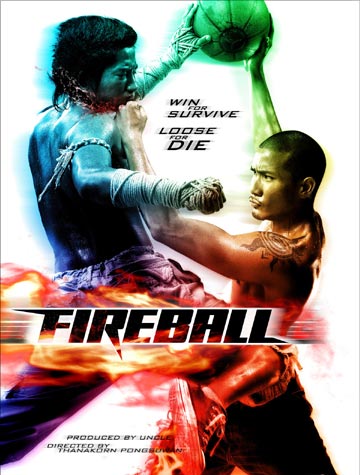
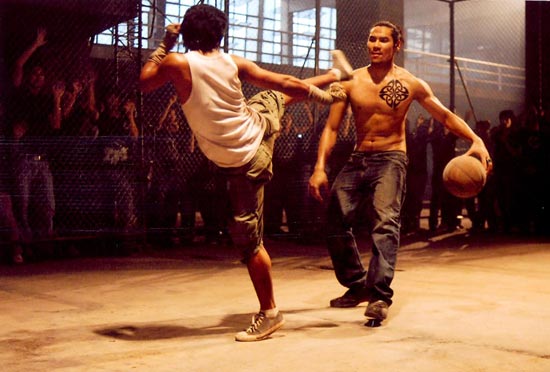

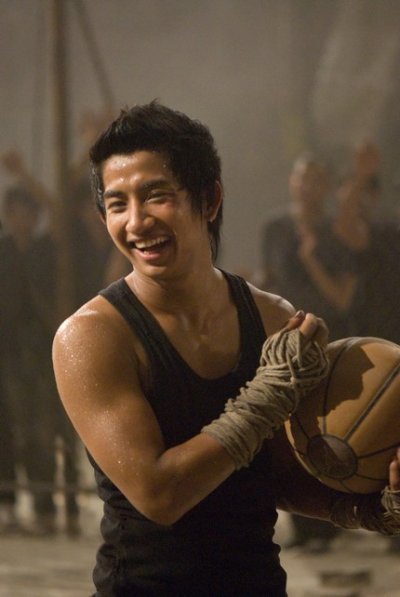
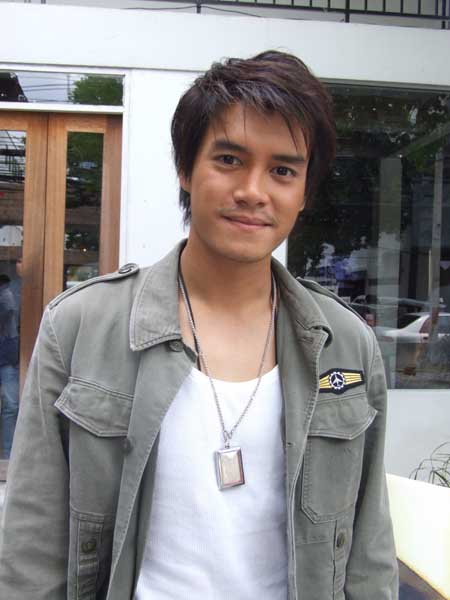

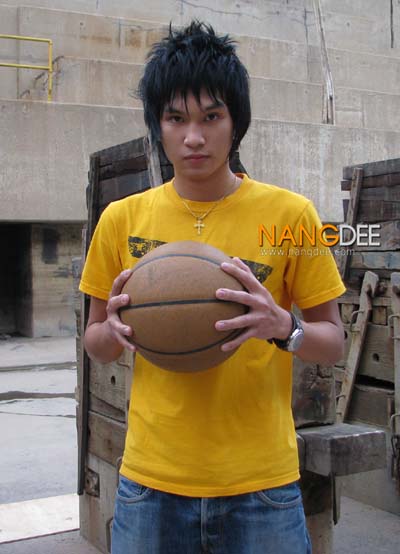

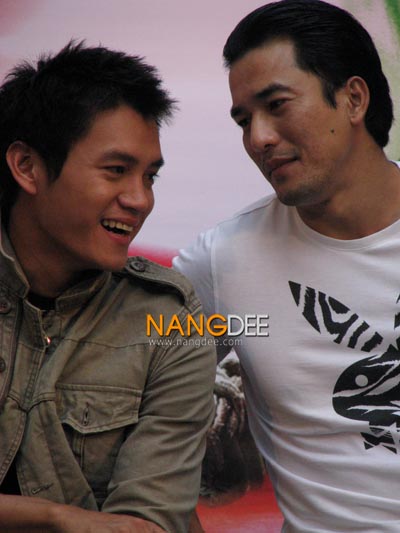

11 comments:
อันที่ทีจริง ฉันคงจะชอบหนังเรื่องนี้เรียบร้อย ถ้าตากล้องไม่เมายา 55555555555(พอกันที ถ่ายแบบ Handheld)
I agree with you that Fireball is the very interesting Thai film and it also represents the Thai socio-political context between the year 1957 to 1973 (พ.ศ. 2500-2516) very well. Especially, the unequal power relationship between the army chiefs, the bourgeoisie, and the petit bourgeoisie in Bangkok in that era.
However, I question about an ability of this film to represent the Thaksin or Post-Thaksin era because the allegory about Thai politics in Fireball is not different from the fixed circle of narrative. But Thai political situation in the present, in my opinion, has a different context from that in three decades ago.
Anyway, I think that Fireball is the best industrial political Thai film which has been made after the 19 September Coup.
พอคุณ MdS พูดถึงดาราหนุ่มหล่อ ๆ ในหนังเรื่องนี้แล้ว ผมก็ขอพูดถึงดาราบางคนในหนังเรื่องนี้บ้างนะครับ
เริ่มจาก "ภูธฤทธิ์ พรหมบันดาล" ผมคิดว่าเขาเล่นหนังเรื่องนี้ได้ดี และบทบาทที่เขาได้รับก็มีมิติน่าสนใจ คือ เขาไม่ใช่คนดีแน่ ๆ แต่ขณะเดียวกัน เขาก็ไม่ใช่คนประเภทเจ้าพ่อเลวบริสุทธิ์ แต่เป็นเจ้าพ่อกระฎุมภีใหม่ที่พยายามจะประคับคองตนเองให้อยู่ในระบบได้มากกว่า
จริง ๆ แล้ว ผมไม่ค่อยคุ้นชินกับภูธฤทธิ์ในบทของคนในยุคปัจจุบันมากนัก 555 แต่ออกจะคุ้นเคยกับเขาในหนังบางระจัน, ละครเรื่องปู่โสมเฝ้าทรัพย์, และละครจักร ๆ วงศ์ ๆ อย่าง เกราะกายสิทธิ์หรือเทพสังวาลย์ ซึ่งบทบาทในละครจักร ๆ วงศ์ ๆ สองเรื่องหลัง ก็มีแง่มุมที่สอดคล้องกับบทบาทในหนังเรื่องท้าชนของเขาเหมือนกัน คือ ในละครจักร ๆ วงศ์ ๆ ภูธฤทธิ์มักจะรับบทบาทอันแสนคลุมเครือ เป็นเทพที่มีสถานะเป็นตัวร้ายตรงข้ามกับพระเอก อยู่เสมอ
ข้อสังเกตอีกอย่างหนึ่งเกี่ยวกับภูธฤทธิ์ก็คือ ผมรู้สึกว่าสำเนียงการพูด (เช่น การเว้นวรรค) ของเขา ไม่ค่อยมีลักษณะเหมือนการพูดของคนปัจจุบันมากนัก 555 ไม่ทราบว่าเขาติดลักษณะการพูดดังกล่าวมาจากการรับบทบาทในหนัง/ละครย้อนยุคหรือจักร ๆ วงศ์ ๆ หรือไม่?
อีกคนหนึ่ง ที่ผมอยากพูดถึงก็คือ กัมปนาท อั้งสูงเนิน ซึ่งเขามักมารับบทบาทในหนังไทยที่ผมชอบหลายเรื่องในช่วงหลัง ๆ เช่น ตำนานสมเด็จพระนเรศวรมหาราชภาค 2 หรือ คนไฟบิน
ผมรู้สึกว่ากัมปนาทดูแลร่างกายของตัวเองดีมาก ๆ (โดยเฉพาะถ้าเทียบกับนักฟุตบอลในตำแหน่งผู้รักษาประตูทีมชาติไทยรุ่นราวคราวเดียวกันกับเขา เช่น ชัยยง ขำเปี่ยม ซึ่งตอนนี้กลายเป็นสตาฟฟ์โค้ชทีมชาติไทยที่ลงพุงหน่อย ๆ ไปแล้ว) ถ้าเข้าใจไม่ผิด เขาน่าจะอายุสี่สิบต้น ๆ และน่าจะมียศทางทหารอากาศเป็นนาวาอากาศตรีหรือโทแล้ว (แต่เขาก็มาเล่นหนังที่มีเนื้อหาต้านระบอบการปกครองที่ทหารเป็นใหญ่อยู่ลึก ๆ 555) แต่เขายังสามารถมาเล่นหนังร่วมกับดาราหนุ่ม ๆ อายุยี่สิบกว่า ๆ ได้อยู่เลย
นอกจากนั้น บทบาทของกัมปนาทในหนังเรื่องนี้ ตลอดจนตัวตนของเขาเอง ก็สะท้อนให้เห็นถึงส่วนเสี้ยวหนึ่งของสังคมไทยในยุคสงครามเย็นช่วงทศวรรษ 2500 ถึงกลางทศวรรษ 2510 ได้เป็นอย่างดี เนื่องจากทั้งเขาและตัวละครดังกล่าวก็ล้วนแล้วแต่เป็นลูกครึ่ง/ผลิตผลของสงครามเวียดนามทั้งสิ้น ซึ่งประเด็นดังกล่าวก็ปรากฏอยู่ในท้าชน โดยเฉพาะอย่างยิ่งในตอนท้าย ๆ ของหนังเรื่องนี้ (ถ้าผมเข้าใจไม่ผิด)
อ้อ ขอหมายเหตุไว้อีกประการหนึ่งครับ
วันนี้ผมไปดูท้าชนรอบหกโมงเย็นที่โรงหนังอีจีวี เซ็นทรัล ปิ่นเกล้า และผมเป็นคนดูเพียงคนเดียวในโรงหนัง 555
นี่เป็นประสบการณ์ครั้งที่สองที่ผมดูหนังในโรงเพียงคนเดียว ครั้งแรกเกิดขึ้นเมื่อกว่าสิบปีก่อน ซึ่งผมไปดูหนังเรื่อง "คนจรฯลฯ" ของอรรถพร ไทยหิรัญ ที่โรงหนังอีจีวี เซ็นทรัล ปิ่นเกล้า เช่นกัน 555
--Thank you very much for your comments, Konmongnang. This is very interesting.
I hadn’t thought about “the Thai politics before 1973” before I read your comments. Your comment made me accept the fact that I may not understand the true meaning of this film at all. Maybe many things in FIREBALL have meanings which are beyond my understanding. However, though I may not understand the true meaning of this film, I would like to share with you my thoughts and my imagination after seeing this film.
Firstly, I would like to clarify one of my approaches towards a film. When I see a film, I don’t care much if I understand it or not. Many film gives me the ultimate pleasure, though I don’t understand it, or though I even misunderstand it. What is important to me is the pleasure I get from a film, not my knowledge of the true meaning of a film.
I get the ultimate pleasure from FIREBALL by watching its handsome actors, by watching its exciting scenes, by “thinking about the film”, and by “imagining many things inspired by the film”. Like many films I love, FIREBALL makes me accept the fact that what gives me the ultimate pleasure not only includes the original film itself, but also includes “another version of FIREBALL”. It’s the version which exists only in my imagination. I would like to call it “My Imagination Inspired By Fireball” or MIIBF here. It’s MIIBF which I would like to share with you. I accept the fact that MIIBF may be very different from FIREBALL, but I enjoy my imagination, and I don’t think it’s wrong to see a film and think about it and imagine another version of it and change it the way I like as long as I accept the fact that my imagination may not correspond to the true intentions of the filmmakers.
--When I saw the character Den (Phutharit Prombundarn) in FIREBALL, there are some characteristics of Den which reminds me of a prime minister. I don’t know the true intention of the filmmakers. Maybe all these similarities between Den and that prime minister are accidental or unintentional. Anyway, it is fun to think about these unintentional similarities:
1.Den is morally grey and is a new bourgeoise (as you already noticed).
2.Den recruits some of his team members (politicians in his political party?) by choosing from talented members of other teams.
3.The police seem to be after Den, but we don’t know even after the film ends if Den committed that crime or that murder or not. This thing unintentionally reminds me of a prime minister who is accused of many things—some of the accusations are true, some of them are unproved, and some of the most serious accusations are just unfounded rumours.
4.Because of that accusation, Den said that he had to flee from Thailand. The only way which can help him stay in Thailand is that his team (political party?) must win the match (election?).
Anyway, Den and that prime minister are a lot different from each other. But these characteristics of Den just accidentally remind me of that person.
--The main reason why I much prefer FIREBALL to BUS LANE is its ending. The ending of FIREBALL unintentionally inspires my imagination very strongly, though I may not understand the true meanting of its ending at all. Anyway, I want to share with you about my imagination.
While the ending of BUS LANE is “too peaceful” or “too happy” in my point of view, I think the ending of FIREBALL is full of anger. It’s the anger of the resurrected twin brother of the hero. I don’t understand at all what this brother wants to do next. He intends to get revenge. But I’m not sure whom he intends to kill next. Anyway, this ending with anger inspires my imagination a lot.
In MIIBF, I imagine that this resurrected brother intends to get revenge on the system which controls the Fireball game. The Fireball game unintentionally reminds me of the so-called democratic system of Thailand. It is an “unfair” game, full of cheating, corrupted by illegal money (capitalism?), and the winning team may be allowed to do some illegal business more easily, but the winning team will not be the master of the country. The winning team, who may win either by cheating or by fighting fairly, must still obey and try to please the biggest mafia (the military?).
In my imagination, the resurrected brother is angry, very angry. He will not play in the game any more. What he wants to do first is not to destroy the game (election) or the corruption in the game, but he may want to destroy the biggest mafia or the system which controls the game (totalitarianism which disguises itself as democracy). I like my imaginative ending very much. I know that the filmmakers may not intend anything like this at all. But that is not important to me. The original FIREBALL just inspires MIIBF in my head, and I get the ultimate pleasure from imagining that the resurrected brother will try to kill the biggest mafia after the film ends. The resurrected brother can’t stand this totalitarian system any more.
--Another thing that I like in FIREBALL is the biggest mafia, who looks noble or elegant. It’s different from the character of Ton (Arucha Tosawasdi), who looks very villainous. Most villains in Thai films look very villainous like Ton, but I’m more interested in a “noble-looking villain” like this biggest mafia in FIREBALL, or like Sadok (Nirut Sirijanya) in OPAPATIKA (2007, Thanakorn Pongsuwan, B+ ), who can disguises himself as an innocent-looking woman and can “manipulate” many supernatural characters to come to help him destroying his enemy, until these supernatural characters are able to “see the truth” (this thing accidentally reminds me of the word “eye-cleansing”) that the beautiful woman is actually the old evil man who wants to be immortal (if I remember it correctly).
--In the future, if the filmmakers of FIREBALL say that I misunderstand this film totally, I won’t like this film less. I truly enjoy my imagination inspired by this film, and that’s the most important thing for me.
--Thank you very much for the information on Phutharit Prombundarn. I didn’t know that he also stars in Thai folklore TV series. Is he shirtless while playing in these TV series? Hahaha. I also just knew that Kasem Promdontree (เกษม พรหมดนตรี), a very muscular and handsome model, stars in a Thai folklore TV series called THE DAUGHTER OF MONKEY (ธิดาวานร). This information about handsome actors in folklore series makes me wish someone should make a gay folklore TV series in the future, so that these handsome actors can play in them and they can be scantily clad all the time like Thai men in the ancient times.
--I wouldn’t have guessed that Kumpanat is that old. His body still looks great.
--If I remember it correctly, I went to see FIREBALL at Paragon on Monday, February 2. The showtime was scheduled at 13.20. I went to buy the ticket at 13.30, because I knew that the advertisement would last about 30 minutes, but the ticket seller told me that the film showing had been cancelled because no one bought the ticket.
So I went to see this film at Grand EGV Siam Discovery around 13.50. There were about ten people in that showing. However, I felt very sad that no one wanted to see this great film at Paragon.
I was the only one audience when I went to see SMILING GANGSTER (HOD NA HIAW) (2009, Rerkchai Puangpetch, A+/A) at UMG RCA several weeks ago.
เรามาเพิ่มเติมประเด็นนะ เราเองไม่ได้คิดถึงประเด็นที่พี่จิตรคิดเลยแม้จะรู้สึกว่าหนังเรื่องนี้มีประเด็นทางการเมืองแน่ๆเหมือนกัน แต่พออ่านที่พี่จิตรเขียนมันก็คลิกเป็นข้อๆเลย
1. พิจารณาว่าลูกทีมของเด่น ล้วนเป็น คนชั้นล่างที่ต้องดิ้นรนอย่างยิ่ง
2. ในหนังมีชื่อตัวละครชื่อหมึก อันนี้เพื่อนเราทึกทัก (อย่างน่าสนใจว่าชื่ออังกฤษของตาคนนี้คือ MUK) แถมยังเป็นคนขายหมูอีกต่างหาก
3. เราไม่คิดว่าตัวละครไท ในเรื่องจะใช้วิธีจัดการกับมาเฟียนะ เรารู้สึกว่าเขาต่อต้านระบบด้วยการทำลายทั้งระบบ คือการสูญเสีย แทน ไม่มีความหมายกับเขาอีกต่อไป ที่มีปัญหาคือเขาจะเล่มทั้งระบบโดยใช้ปืน (ในทางนี้อาจไม่ใช่การปฏิวัติ แต่เป้ฯการหลั่งเลือด ) ไม่ว่าจะอย่างไรที่แน่ๆ มันไม่มีเหตุผลบอีกต่อไป
4.ไม่ว่าจะตั้งใจหรือไม่ การเชคของของสิงห์ในช่วงท้ายทำให้เรานึกถึงการเปลี่ยนขั้วหลังการเลือกตั้งที่ผ่านมาอย่างมาก
5.ตัวละครที่อยู่ลำดับขั้นสูงสุดช่างหน้าคล้ายมาก
เราอาจจะไม่ได้ปลื้มกับผู้ชายในเรื่องนี้ (กล่าวตามจริงคือเราไม่ได้ปลื้มผู้ชาย หรือถ้าจะปลื้มก็ไม่ใช่ประเภทนี้ ฮา!) แต่เราก็ชอบหนังเรื่องนี้ในระดับA++++เหมือนกัน เพราะเรารู้สึกว่าหนังcapture กรุงเทพได้แม่นมั่นมาก เราชอบฉากบ้านอิ๊ก โดนไล่ที่มาก รู้สึกว่ามันจริงกว่าหนังแปดวันแปลกคนทั้งเรื่องด้วยซ้ำ
โดยส่วนตวพบว่า ธนากรณ์ พงศ์สุวรรณ capture กรุงเทพได้ดีมากๆ ตั้งแต่คนชั้นกลางในเฟค จนมาถึงคนชั้นล่างในนี้ เขาอาจเป็นผู้กำกับไม่กี่คนที่ถ่ายกรุงเทพได้น่าทึ่งมากๆ
ขออนุญาติสรุปประเด็นทั้งของคนมองหนัง และของพี่จิตรไปเขียนอีกทีได้ไหม(ขอไปก่อนไม่รู้จะมีเวลาไหม)
--ดีใจมากจ้าที่ Filmsick ได้ดูหนังเรื่องนี้ Filmsick สามารถเอาสิ่งที่เราเขียนไปใช้ประโยชน์ต่อได้จ้ะ แต่ถ้าจะเอาไปเขียนอะไรที่มันล่อแหลมทางการเมืองมากเกินไป ก็ไม่ต้องบอกว่ามาจากเรานะ บอกว่ามาจาก "เพื่อนคนนึง" ก็ได้
--ตอนนี้รู้สึกว่าอยากดู OPAPATIKA อีกรอบ เพื่อดูว่าความรู้สึกที่ได้ดูหนังเรื่องนี้ในปี 2007 กับปี 2009 มันมีอะไรเปลี่ยนแปลงไปหรือเปล่า โดยส่วนตัวแล้วรู้สึกว่า FIREBALL ให้ความบันเทิงและดูสนุกกว่า OPAPATIKA มาก แต่ FIREBALL ก็ทำให้ฉุกคิดขึ้นมาได้ว่า เราอาจจะมองข้ามอะไรบางอย่างใน OPAPATIKA ไปหรือเปล่า
Thank you very much for your comments too, MdS and Filmsick. I think your interpretations about Fireball are very interesting.
First of all, I think Khun MdS’s approach towards Fireball is legitimate, especially when this film is not successful in the market so the various interpretations for it is the only gift that we, the audiences, can give to its filmmakers in this time.
Second, I thought about Thai politics before 1973 when I watched this film because the power relationship between the army chiefs, the bourgeoisie, and the petit bourgeoisie which is the important point in Fireball in my opinion was firstly emerged in Sarit era and then it was developed increasingly in Thanom era until the May 1992 that its influence was cut down. Therefore, Fireball may show us both socio-political contexts which were occurred before and after 14 October 1973. However, this interpretation is only my imagination too and the filmmakers of this film can think differently from you and me 555.
When I saw Den’s character, I did not think about that former Prime Minister, himself, suddenly but I think that Den and many bourgeois mafia in Fireball are the same group of people as that PM and other important politicians in this country, who have been done some businesses, both legal and illegal, and must depend on the power of army chiefs or high-ranking officials. I am not sure that this film can represent that PM’s life completely however it has an ability to represent the culture or the way of life of some group of people which that PM is a member of it.
However, I think Den has an important manner that is different from that PM because while that former PM can do something, both good and bad things, which broke the old Thai political system, but Den try to articulate his interest with other interests of the army chief and other mafias. So Den, in my opinion, cannot break the old Fireball system anymore.
Therefore, I think the revenge of Tan at the end of this film is very interesting because it challenges us to interpret its meaning. In my point of view, Tan can be both the breaker of Fireball system and the other one who will go the violent circle of this game after he shot a Fireball mafia who used to oppress his girlfriend and twin brother.
Moreover, I like a character of the biggest mafia as same as you but I would like to call him “the white hair old soldier”555. If you can remember, Captain Wanchart Chunhasri, who performed as the white hair old soldier in this film, had performed as Somdej Chaopraya Barommahasrisuriyawong or a defend minister in Tawipop or Siam Renaissance too. I think Wanchart has a manner of the charismatic leader so he performed very well both in Fireball and Siam Renaissance. However, his good performance in Fireball makes me think that there are not Thai army chiefs, who are under 60, who have such charismatic manner in the recent years except the real white hair old soldier 555.
Finally, I would like to inform you that Phutharit Prombundarn is shirtless in the Thai folklore series called Kroh Kaiyasit or The Magical Armour. 555
ขอคุยต่อเนื่องจากประเด็นที่คุณ Filmsick เสนอมานะครับ
ตามความเห็นของผม ลูกทีมของเด่นนั้นมีส่วนผสมที่คละกันระหว่างคนชั้นล่างที่ยากจนจริง ๆ เช่น อิก (บ้านอยู่ชุมชนใต้สะพาน ไม่มีเงินจ่ายค่าเช่าบ้าน) หรือ หมึก (คนชำแหละหมูในตลาดสด) กับบรรดากระฎุมพีน้อย หรือ บรรดาคนชั้นกลางระดับล่างที่เพิ่งก่อร่างสร้างตัวขึ้นในเมืองใหญ่ (แต่ฐานะก็อาจจะยังไม่ได้ดีมากนัก) ได้แก่ พวกแทนและไท (นักบาส, นักเลง, อยู่อพาร์ตเมนต์) สิงห์ (พนักงานในห้างสรรพสินค้า) และคุณอีกคนนึงซึ่งผมจำชื่อไม่ได้ (ที่มีลักษณะเป็นเพลย์บอยหน่อย ๆ) และสามคนหลังนี้ก็ดันเป็นตัวละครสำคัญประจำทีมเสียอีก
ด้วยเหตุนี้ ผมจึงมองว่าหนังพูดเรื่องความสัมพันธ์ทางอำนาจที่ไม่ทัดเทียมกันระหว่าง “ขุนศึก” “กระฎุมพี” และ “กระฎุมพีน้อย” เป็นหลัก
สำหรับเรื่องหมึก (Muk) ขายหมูก็น่าสนใจดีครับ 55555
อย่างไรก็ตาม เรื่องชื่อของตัวละครบางคนในหนังเรื่องนี้ ทำให้ผมนึกถึงอีกกรณีหนึ่ง นั่นคือชื่อตัวละครนำที่เป็นฝาแฝดของเรื่อง ได้แก่ แทนกับไท นั้น ทำให้ผมนึกถึงชื่อของลูกชายคนแรกของเสกสรรค์ ประเสริฐกุล และ จีระนันท์ พิตรปรีชา คือ แทนไท ประเสริฐกุล ซึ่งถือกำเนิดในระหว่างที่พ่อแม่ของเขากำลังต่อสู้ร่วมกับพคท.อยู่ในป่า ภายหลังจากเหตุการณ์ 14 และ 6 ตุลาฯ ผมจึงรู้สึกว่า แทนกับไทในหนังมีความเป็นกบฏต่อเกมไฟเออร์ บอล คล้าย ๆ กับบรรดานักศึกษาที่เป็นกบฏต่อสังคมไทยในช่วงเวลา 35 ปีก่อนพอดี (แต่อย่างที่ผมตั้งคำถามในส่วนที่ตอบคุณ MdS ไปแล้วเช่นกันว่า ผมไม่แน่ใจว่าการแก้แค้นของแทนตอนท้ายเรื่อง จะทำให้เขากลายเป็นผู้ริเริ่มโค่นล้มเกมไฟเออร์ บอล หรือว่าการเหนี่ยวไกปืนดังกล่าวจะยิ่งม้วนกลืนเขาไปสู่วังวนแห่งความรุนแรงของเกมไฟเออร์ บอลกันแน่?)
ส่วนเรื่องตัวละครลำดับขั้นสูงสุดนั้น ผมตอบไปแล้วเป็นภาษาอังกฤษเช่นกันนะครับ แต่ไม่ทราบว่าจะเห็นตรงกันหรือเปล่า?
คงจะขออนุญาตคุณ MdS และคุณ Filmsick ที่จะนำสิ่งที่เราแลกเปลี่ยนความคิดเห็นกันเกี่ยวกับ “ท้าชน” ไปเขียนถึงเช่นกันครับ (แต่คงเป็นอีกสองสามเดือนหน้า เนื่องจากผมกะจะดูดีวีดีของหนังเรื่องนี้ก่อนอีกครั้งหนึ่ง) รู้สึกว่านี่มันช่างเป็น “สัมพันธบท” (intertextuality) มาก ๆ เลย 555
ขอเสริมเรื่องกัมปนาท อั้งสูงเนิน/หมึกในหนัง อีกหน่อยนึงครับ
ตอนผมดูท้าชน ผมรู้สึกผูกพันกับกัมปนาท/ตัวละครตัวนี้มากเป็นพิเศษ อันเนื่องมาจากสองประเด็น คือ
หนึ่ง ตอนเป็นนักฟุตบอลตำแหน่งผู้รักษาประตูของทีมทหารอากาศ กัมปนาทก็เคยถูกกล่าวหาว่าล้มบอลเช่นกัน (เช่นเดียวกับหมึกในหนังเรื่องนี้ที่ตัดสินใจล้มบาสจริง ๆ เพื่ออนาคตของครอบครัว) เขาพยายามปฏิเสธและบอกว่าแค่รายได้จากการเป็นนายแบบและนักแสดงก็ทำให้เขามีเงินมากกว่านักฟุตบอลรายอื่น ๆ อยู่แล้ว แต่ดูเหมือนเมื่อสิบกว่าปีก่อน ทั้งสื่อกีฬาหรือแม้แต่ผู้ดูแลทีมฟุตบอลทหารอากาศที่เป็นนายทหารใหญ่เองก็จะไม่เชื่อในคำแก้ตัวของเขา สุดท้าย กัมปนาทจึงค่อย ๆ ต้องห่างหายจากวงการฟุตบอลไทยไปในที่สุด
สอง หมึกในหนังมีอาชีพชำแหละหมูในตลาด ผมเข้าใจว่าฉากร้านชำแหละหมูในหนังเรื่องนี้ อาจอยู่ตรงย่านชำแหละหมูแหล่งใหญ่บริเวณตลาดพรานนก ซึ่งอยู่ใกล้ ๆ บ้านผมพอดี เวลาผมกลับบ้านดึก ๆ ประมาณห้าทุ่มถึงเที่ยงคืน จึงมักเห็นภาพผู้ชายใช้แรงงานหลาย ๆ คนถอดเสื้อชำแหละและแบกซากหมูอยู่ริมฟุตบาทด้านหน้าห้องแถวจำนวน 5-6 ร้านเป็นประจำ อย่างไรก็ตาม ฉากร้านชำแหละหมูในท้าชนอาจไม่ได้อยู่ตรงตลาดพรานนกก็ได้ เพราะแม้แต่อาแปะที่ร้านก๋วยเตี๋ยวหมูในซอยบ้านผมเอง (ปัจจุบัน อาแปะเสียไปแล้ว) ก็เคยบอกพ่อผมว่า ร้านแกสั่งเนื้อหมูสดมาจากตลาดบางแค ไม่ใช่ตลาดพรานนก เนื่องจาก หมูสดจากตลาดบางแคจะชำแหละกันตอนตีสี่ตีห้า ทำให้สดกว่าหมูจากตลาดพรานนกที่ชำแหละตอนห้าทุ่มเที่ยงคืน
Thank you very much, Konmongnang, for your comments and interesting information.
Yes, I think Wanchart Chunhasri is very charismatic. I didn’t remember him in THE SIAM RENAISSANCE. The thing I can remember the most about that film is that Rangsiroj Panpeng is very handsome. Hahaha.
The playboy character in FIREBALL is named “K” (Anuwat SaeJao)
I also think like you that the names of “Tai” and “Tan” are very interesting. Apart from reminding us about Tantai Prasertkul, these names also have interesting meanings of their own, because “Tai” means “freedom” and “Tan” can mean “representative”.
If I remember it correctly, in the middle of the film, when the five good players race with each other in a crowded apartment to put the ball through the hoop, Ig is the winner of this game. Does this scene have special meaning? Can it mean that if this game is played fairly without violence, the winner will be the representative of the poorest or the needy? Hahaha.
Like you, I am not sure if the revenge at the end of the film will lead to “anarchy” or “the end of totalitarianism”. I think the filmmakers don’t know, either. All of us have to wait and see what will happen in the near future in Thailand.
The story about Kumpanat is interesting. That kind of rumor is very bad, because it is hard to prove or disprove it. Do you remember Spun Selakun, the famous model who became a rumor victim in 1980’s? I think Spun Selakun is more fortunate than Kumpanat in this aspect, because she could prove easily if she was HIV-infected or not.
Talking about half-black half-Thai person reminds me of the TV series RICE OUTSIDE THE FARM (ข้าวนอกนา) (directed by Tapakorn Disayanun), which deals with the children left behind by those US soldiers in Vietnamese war. I used to read this novel by Seefar Ladawon when I was a little child. At that time, I thought the ending of this novel is quite unexpected for me, because the black heroine, who always wanted a “handsome” husband, did not get what she wanted at the end of the story. At first I thought this novel would have “a happy ending” like most Thai melodramatic novels, but this novel chooses to end “realistically” instead of “very happily”.
This is the title of RICE OUTSIDE THE FARM
http://www.youtube.com/watch?v=PdbeaUHk7ik
Post a Comment